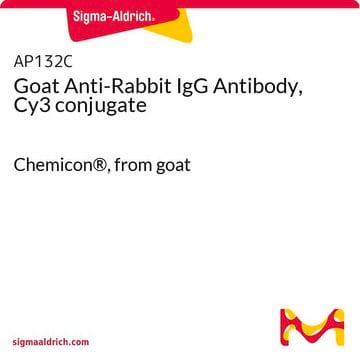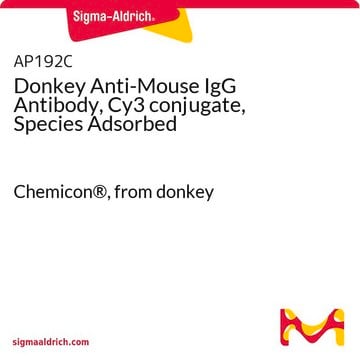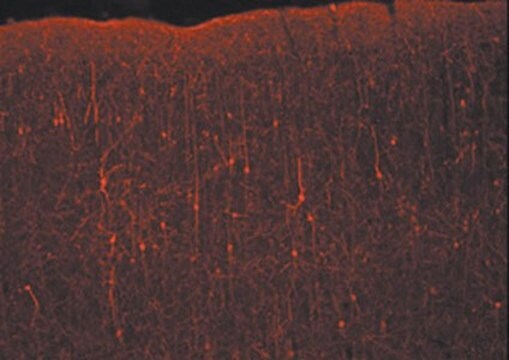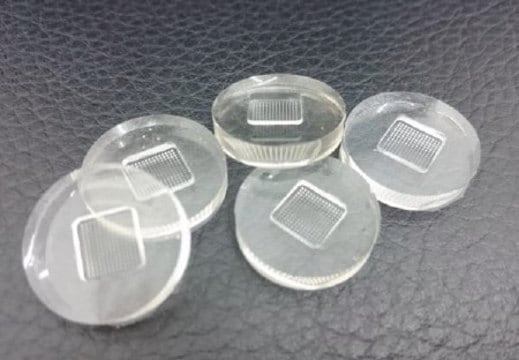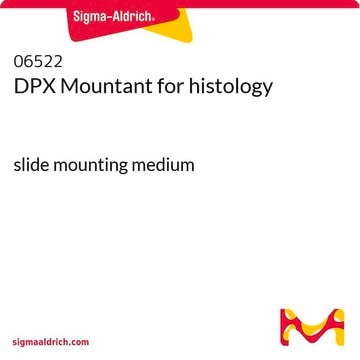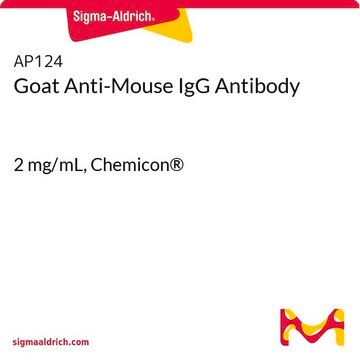AP124C
Goat Anti-Mouse IgG Antibody, Cy3 conjugate
Chemicon®, from goat
Synonym(s):
Goat IgG Antibody
Sign Into View Organizational & Contract Pricing
All Photos(1)
About This Item
UNSPSC Code:
12352203
eCl@ss:
32160702
NACRES:
NA.46
Recommended Products
biological source
goat
Quality Level
conjugate
CY3 conjugate
antibody form
F(ab′)2 fragment of affinity isolated antibody
antibody product type
secondary antibodies
clone
polyclonal
species reactivity
mouse
manufacturer/tradename
Chemicon®
technique(s)
immunofluorescence: suitable
shipped in
wet ice
target post-translational modification
unmodified
General description
Immunoglobulin G (IgG), is one of the most abundant proteins in human serum with normal levels between 8-17 mg/mL in adult blood. IgG is important for our defence against microorganisms and the molecules are produced by B lymphocytes as a part of our adaptive immune response. The IgG molecule has two separate functions; to bind to the pathogen that elicited the response and to recruit other cells and molecules to destroy the antigen. The variability of the IgG pool is generated by somatic recombination and the number of specificities in an individual at a given time point is estimated to be 1011 variants.
Application
Research Category
Secondary & Control Antibodies
Secondary & Control Antibodies
Research Sub Category
Whole Immunoglobulin Secondary Antibodies
Whole Immunoglobulin Secondary Antibodies
This Goat anti-Mouse IgG Antibody, Cy3 conjugate is validated for use in IF for the detection of Mouse IgG.
Legal Information
CHEMICON is a registered trademark of Merck KGaA, Darmstadt, Germany
Disclaimer
Unless otherwise stated in our catalog or other company documentation accompanying the product(s), our products are intended for research use only and are not to be used for any other purpose, which includes but is not limited to, unauthorized commercial uses, in vitro diagnostic uses, ex vivo or in vivo therapeutic uses or any type of consumption or application to humans or animals.
Not finding the right product?
Try our Product Selector Tool.
Hazard Statements
Precautionary Statements
Hazard Classifications
Aquatic Chronic 3
Storage Class Code
11 - Combustible Solids
WGK
WGK 3
Certificates of Analysis (COA)
Search for Certificates of Analysis (COA) by entering the products Lot/Batch Number. Lot and Batch Numbers can be found on a product’s label following the words ‘Lot’ or ‘Batch’.
Already Own This Product?
Find documentation for the products that you have recently purchased in the Document Library.
Junping Yao et al.
Neural regeneration research, 7(16), 1228-1233 (2012-06-05)
Channelrhodopsin-2 ectopically expressed in the retina can recover the response to blue light in genetically blind mice and rats, but is unable to restore visual function due to optic nerve or optic tract lesions. Long Evans rats at postnatal day
The roles of fission yeast ase1 in mitotic cell division, meiotic nuclear oscillation, and cytokinesis checkpoint signaling.
Yamashita, A; Sato, M; Fujita, A; Yamamoto, M; Toda, T
Molecular Biology of the Cell null
Telencephalic neurons monosynaptically link brainstem and forebrain premotor networks necessary for song.
Roberts, TF; Klein, ME; Kubke, MF; Wild, JM; Mooney, R
The Journal of Neuroscience null
Martin Hennenberg et al.
American journal of physiology. Renal physiology, 305(10), F1383-F1390 (2013-09-21)
Inhibition of prostate smooth muscle contraction is an important strategy for medical treatment of lower urinary tract symptoms (LUTS). Besides α1-adrenoceptors, prostate smooth muscle contraction is induced by activation of thromboxane (TXA2) receptors (TXA2-R). Here, we examined the effects of
He Huang et al.
Cytotechnology, 68(5), 2083-2103 (2016-01-29)
The repair of meniscus in the avascular zone remains a great challenge, largely owing to their limited healing capacity. Stem cells based tissue engineering provides a promising treatment option for damaged meniscus because of their multiple differentiation potential. We hypothesized
Our team of scientists has experience in all areas of research including Life Science, Material Science, Chemical Synthesis, Chromatography, Analytical and many others.
Contact Technical Service
